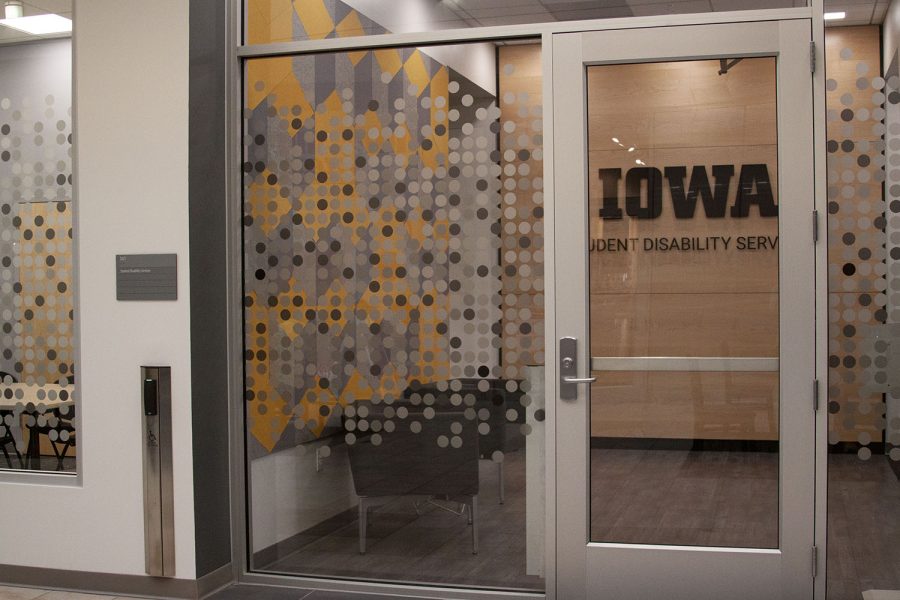Opinion | Students with disabilities deserve advocacy
Students with a disability on campus need more support from administration and allies.
The outside of the Student Disability Center in the Old Capitol Mall is seen in Iowa City on Tuesday, March 1, 2022.
March 1, 2022
Disabilities are more than obstacles to overcome. They are life-altering identities that can bring groups of people together over common experiences.
Disabilities come in many forms. Some are visible to outsiders, and others are not. Some folks are disabled for a few months due to accidents or surgeries, while others experience disabling conditions that last a lifetime.
Even though University of Iowa Student Disability Services, or SDS, is a great resource for academic accommodations, disabled students need more to ensure a community exists for them on campus.
UI Students for Disability Advocacy and Awareness, or UISDAA, is one group on campus focused on bringing disabled students and allies together to create a supportive, understanding community. UISDAA consists of undergraduate, graduate, and professional UI students.
UISDAA has advocated for a new SDS location on campus. The office recently moved from the basement of Burge Residence Hall to a more accessible location in the University Old Capitol Town Center.
Nathan Albano is the current president of UISDAA and the Undergraduate Student Government Disability Constituency Senator. He commented on the transition to the new SDS office located in the University Old Capitol Town Center, stating the old location was never meant to be permanent.
“This new location says UI can’t tuck us under a stairwell, figuratively and literally,” Albano said. “We aren’t under their radar, and they can’t ignore us.”
SDS provides accommodations and academic success plans for disabled students on campus. It also partners with other campus offices to provide support and advocacy training for marginalized groups, including disabled folks.
On Feb. 25, SDS and University Counseling Services, or UCS, staff hosted a chronic disability support group meeting focused on self-advocacy.
In conversation, they discussed various forms of advocacy and the ways students with chronic disabilities can support themselves and find support on campus as well.
According to the presentation, self-advocacy consists of two key components: self-awareness and communication. Self-awareness is the understanding of one’s own needs so that these needs can be clearly and authentically communicated.
More information on UCS-led support groups, including meeting times and dates, can be found on the program’s UI website.
An issue of high concern during the COVID-19 pandemic is making sure there are safe spaces on campus for immunocompromised students.
The American Disability Act, established by the U.S. Equal Employment Opportunity Commission, however, does not require employers to reasonably accommodate all extra disability requests as a result of COVID-19. This applies to school administrations and boards.
The American Federation of State, County and Municipal Employees, or AFSCME, is the largest nationwide trade union organization within the U.S.
AFSCME Council 3, located in Baltimore, Maryland, explained in an online publication in 2020 that the ADA was never intended to handle crises as large scale as the COVID-19 pandemic.
“SDS is no longer allowed to give people accommodations to protect immunocompromised people in classroom settings,” Albano said about these unclear ADA guidelines. “SDS has tried [to continue these accommodations], but I think the pushback is primarily from the Board of Regents.”
The removal of Temporary Alternative Learning Arrangements happened before the start of the fall 2021 semester. The plans were previously offered to protect medically vulnerable students from being exposed to COVID-19.
For people like Abbie Steuhm, a UI transfer student, not all people with disabilities use institutional services to represent their needs in the classroom and on campus.
“I prefer going to my professors on my own,” Steuhm said. “This doesn’t mean that SDS is not important on campus, but not all students need them either. We all need community though.”
This is why UISDAA also has been in conversation about creation of a cultural house or other permanent location on campus for this population.
“Overcoming institutional barriers and stigmas is often the hardest part of disability advocacy work,” Steuhm said.
Albano added that it is hard to get people and advocates to show up for the community or to align themselves with the term disabled.
“Disabilities are seen as individual identities, but not as a community who needs to be protected,” Albano said. “Society needs to move towards the recognition that disabled isn’t a nasty word.”
UISDAA is always welcoming new members who identify as disabled or those who are allies.
“Even if someone only has 30 minutes once a semester, showing up is what matters,” Steuhm said. “Knowing others care and want to support us matters.”
Columns reflect the opinions of the authors and are not necessarily those of the Editorial Board, The Daily Iowan, or other organizations in which the author may be involved.














